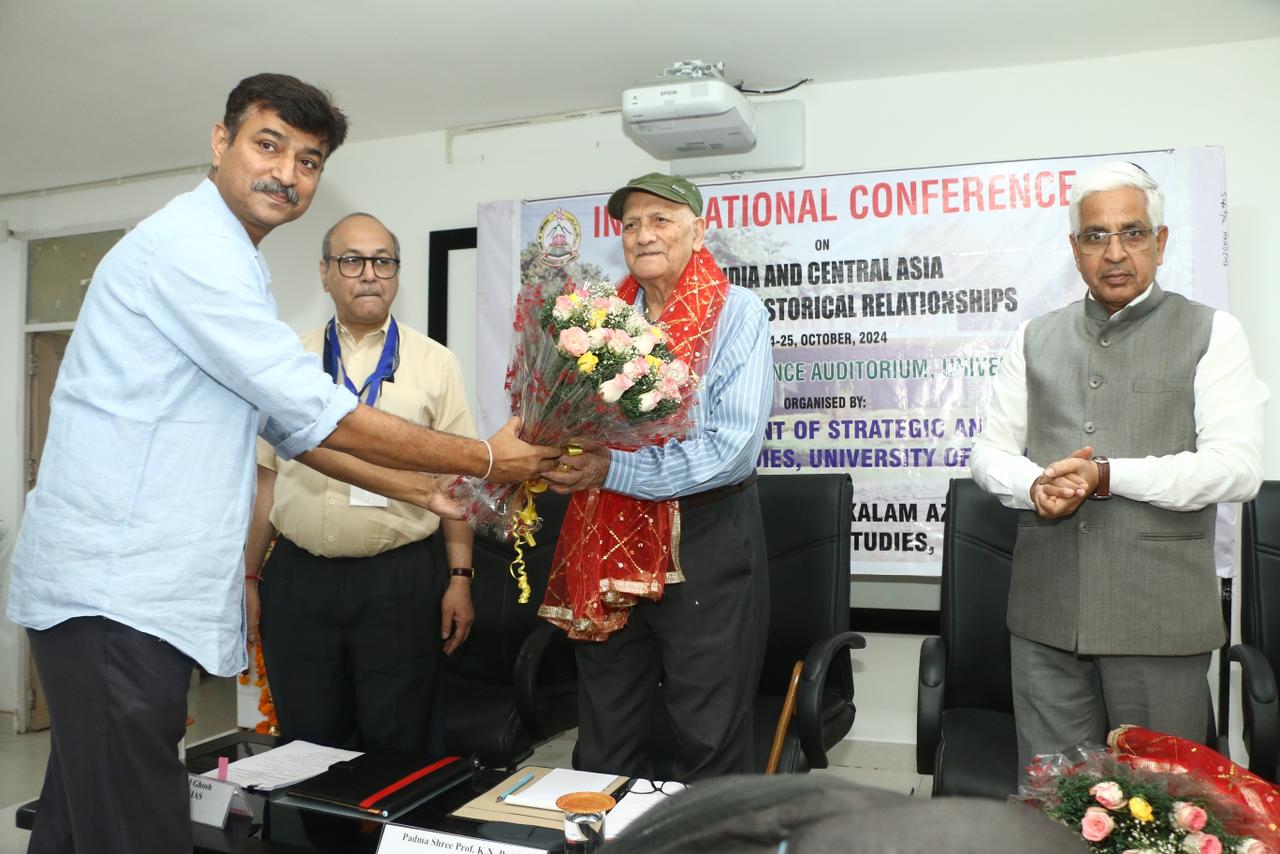About University

Cradled in the lap of mountains at the foothills of auspicious Trikuta, besides the river Tawi at an altitude of 1030 ft. is Jammu. This 'city of temples' has many places...
The Vice Chancellor University of Jammu Prof. Umesh Rai today highlighted the crucial role of academic institutions in promoting regional diplomacy and mutual understanding.
Presiding over the inaugural function of the International Conference on 'India and Central Asia: Renewing Historical Relationships', the Vice Chancellor called upon the faculty to initiate interdisciplinary empirical research, focusing on India's international engagements, particularly with Central Asia. He underscored the importance of academic dialogues in enhancing India's strategic, cultural, and economic ties with the region.
The inaugural session of the International Conference, organised by the Department of Strategic and Regional Studies (DSRS), University of Jammu, in collaboration with the Maulana Abul Kalam Azad Institute of Asian Studies (MAKAIAS), Kolkata, was held at the seminar Hall of the Department of Environment Sciences. The conference aims to promote dialogue and renew the centuries-old historical, cultural, and strategic ties between India and Central Asia.
On the occasion, a message from Hon’ble Lieutenant Governor Shri Manoj Sinha, who is the Chancellor of the University of Jammu, expressing his support for the conference and highlighting the significance of India’s ties with Central Asia, was read out by Dr. Surinder Mohan, Assistant Professor of the DSRS.
Dr. Sarup Prasad Ghosh, Director, Maulana Abul Kalam Azad Institute of Asian Studies (MAKAIAS), Kolkata, in his address to the Conference, stressed on promoting collaborative research and policy-oriented dialogue to deepen mutual understanding and cooperation between India and Central Asia.
Padma Shree Prof. K.N. Pandita, a renowned scholar, in his Keynote address spoke on the historical connections between India and Central Asia. He observed that in the ancient period, India was not connected with Central Asia only through its trade and economic activities, but also, through its linguistic, cultural and religious interactions and cooperation. The impact of India’s civilization on Central Asia can be seen in the languages of these countries as their vocabulary is influenced by India's Sanskrit language, symbols, artefacts and monuments, he added. 
Prof Pandita said that after 1947, India’s connectivity and cooperation comparatively declined. However, now in the present times, efforts are being made to reinvigorate these ties with India joining the SCO and India organising International Buddhist Conference to remind the country’s Buddhist connections with the Central Asian countries.
Prof. Pandita suggested how these relationships can be further leveraged in the current global context.
The Guest of Honour of the event Shri Ashutosh Bhatnagar, Director, Jammu Kashmir Study Centre, New Delhi talked about the contemporary economic, strategic and security imperatives prevailing at regional and global level which necessitate closer collaboration between India and Central Asia.
Earlier, Prof. Virender Koundal, Director, DSRS, University of Jammu, in his welcome address emphasized the importance of India’s relations with Central Asia, in the historical, cultural and strategic contexts.
Dr. Mohd. Monir Alam, Organizing Secretary of the Conference and a faculty member of the DSRS, University of Jammu, while introducing the theme and objectives of the conference, highlighted the evolving geopolitical landscape and the renewed focus on India-Central Asia cooperation in areas like trade, security, and cultural exchange.
Dr. Suneel Kumar from the Department of Strategic and Regional Studies, University of Jammu, concluded the inaugural session with a vote of thanks, expressing gratitude to all dignitaries, participants, and organizing teams for their contributions to the conference.
This two-day conference is being organised in the hybrid mode in which various scholars from different Indian academic institutions and Central Asian countries especially from Tajikistan and Uzbekistan will participate in the different academic sessions, panel discussions, and paper presentations to explore the historical and contemporary aspects of India-Central Asia relations. Eminent academicians, research scholars and students of Jammu University including Prof. Jasbir Singh, Prof. Suman Jamwal, Prof. Pawan Kumar, Prof. Prakash Chand Antahal, Prof. Vinay Chauhan, Prof. Sunita Sharma, Prof. Anil Gupta, Prof. Priyanka Sharma, Dr. Madhulika Singh, Dr. Suman, Dr. Tarsem Lal, Dr. Jivan Jyoti, Dr. Saya Priya, Dr. Vikram Sahi, Dr. Tarsem Singh, Dr. Tilak Sharma, Dr. Ganesh Malhotra, Dr. Ranjan Sharma, Dr. Anu Mankotia, Dr. Anju Bala also attended the inaugural session of the conference.
Apart from this, Brig. S. S. Katoch and Col. Manish Sharma, 16 Corps, Indian Army, Nagrota also attended the conference and extended their best wishes to the DSRS hi for organising such productive academic event having huge relevance for India’s national strategic and security interests.